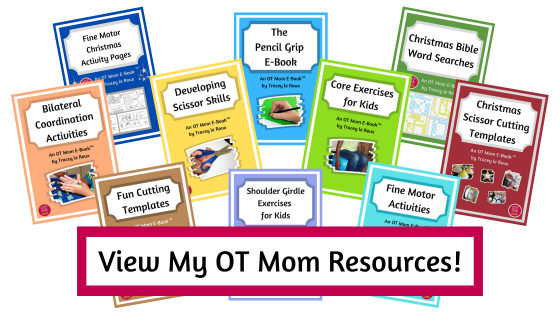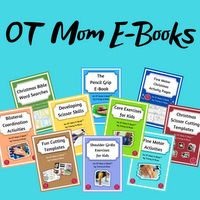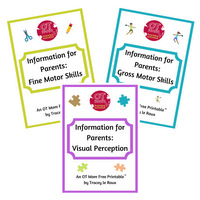- Home Page
- Playdough Activities
Playdough Activities That Build Crucial Skills
These simple, screen-free playdough activities are powerful developmental tools for your child! From developing coordination skills, to exploring math concepts, discover how a simple ball of playdough can be so much fun!
As an occupational therapist and homeschool mom, these activities have been a staple!
I sometimes link to products (#Ad) that are similar to those I use and love. If you do purchase something through my links, I will receive a small commission that helps support my site - thank you!
Key Takeaways For Busy Parents:
- More Than Just Play: By incorporating rolling, pounding and squashing actions, you can help your child build bilateral coordination and fine motor skills.
- Calming Sensory Tool: The inherent resistance of playdough can help calm a stressed child or help a distracted child to focus and self-regulate.
- Hands-On Learning Tool: Use playdough to make learning come to life - demonstrate counting and fractions, or form letters and numbers out of playdough.
- Screen-Free Fun: Playdough is an inexpensive, effective way for parents and kids to connect for hours of creative, screen-free entertainment!
- Benefits of playdough play
- Playdough for bilateral coordination skills
- Playdough math activities
- Playdough project ideas
- Playdough and sensory processing
- Related pages: Playdough for toddlers, and playdough for fine motor skills

The Benefits of Playdough Play
Playdough is a perfect resource for parents wanting to promote screen-free play with their kids. It can sometimes be hard for a child to figure out what to do with playdough initially, so I encourage parents to sit down with their kids and show them how to explore all the possibilities - scroll down to be inspired!
Here are some of the benefits of playdough play:
- Playdough activities are a great way to help your child develop fine motor skills as well as bilateral coordination skills!
- Most kids enjoy the sensory exploration that playdough provides, and take joy in being creative.
- Many kids (and adults) find a big batch of homemade playdough to be very soothing to play with, possibly because it is gives great proprioceptive feedback!
- In addition, teachers often use playdough as a medium for reinforcing math concepts and letter formations.
In the activities I suggest below, I have highlighted the skills that can be developed using playdough.
Playdough for Bilateral Coordination Skills
"Get the playdough ready" is a playdough exercise I love to do with preschoolers and toddlers. It involves pounding a blob of playdough until it is flat and then squashing it back up into a ball.
This gets both sides of the body working together and helps develop bilateral coordination skills.
Pounding Playdough
- Kindergartners and older children will be much better at pounding
rhythmically than preschoolers, so challenge them to pound the playdough
to a
beat that you set.
- Try an alternating movement as shown, or with both hands at the same time (symmetrical movements).
 Pounding rhythmically
Pounding rhythmically- Do the pounding and squashing a few times to “get the playdough ready” before moving onto other playdough activities.
Rolling Playdough Balls
- Break off blobs of playdough and roll them between two hands as shown to make balls of different sizes.
- This is a great bilateral coordination activity with playdough.
 Rolling playdough balls
Rolling playdough ballsThe balls can be used in different creations such as a snowman, caterpillar and many other imaginative uses!
Rolling Playdough Snakes
Rolling out playdough with both hands is a good bilateral activity.
-
Have your child use both hands to roll out a long piece of playdough as shown.
Older children are more able to roll playdough into an evenly shaped long snake.
- You can use these long snakes to make a coil pot, or to form letters and numbers to reinforce letter recognition and letter formations.

Discover more bilateral coordination activities here!
Playdough Math Activities
Kids will love using playdough to learn basic fractions and math concepts.
- Have your child roll lots of small balls and then use them to illustrate addition and subtraction.
- You can use cookie cutters like squares and circles to create a shape, and then cut the shape into halves and quarters using a plastic knife, as shown.
- Lines of symmetry can be indicated on playdough shapes that have been cut out with cookie cutters.
 Fractions
Fractions Lines of symmetry
Lines of symmetryPlaydough Projects for Kids
Kindergartners can use sets of colored Play-Doh#Ad to make specific projects. Older kids may prefer the firmer consistency of modeling clay#Ad or air-dry clay#Ad to make their creations.
- A great idea is to make a solar system with the playdough (or modeling clay), rolling lots of different sized balls to make the planets and putting them into orbit around a larger ball to represent the sun.
-
Playdough or modeling clay can also be used to to illustrate the anatomy and structure of parts of a plant/animal.
 Playdough solar system
Playdough solar system A simple model of the brain
A simple model of the brainEncourage your child to use the fingers when rolling out balls and long sausages, to practice fine motor skills. It is easier to just rolling them in the palm of the hand but we really want the fingers to do the work.
Find out how to use playdough to help develop hand strength and better finger control!
Playdough and Sensory Processing
Playdough provides a great sensory medium, which can be used to help children who struggle with sensory processing issues.
- Kids of all ages can find it therapeutic to work with a big ball of non-sticky playdough, because the resistance of pushing and pulling playdough with the hands gives a lot of proprioceptive feedback.
- This can help to calm and focus a child who is feeling stressed or distracted.
 Playdough makes hands work hard
Playdough makes hands work hard- Some kids object to the stickiness of the cheaper brands of shop-bought playdough.Using a well-cooked, non-sticky homemade playdough
can be helpful for children who are usually over-sensitive to tactile
experiences.
Cooking the dough for a minute or two longer than the given time, can reduce potential stickiness even more.
More Playdough Activities!
-
If your child needs to work on fine motor skills, then playdough is a fun way to strengthen hands and work on finger dexterity. This can help improve pencil control and handwriting.
Try these fun Fine Motor Playdough Activities with your child today!
-
If you have a toddler or preschooler, your playdough activities probably need to be less structured than the ones on this page.
Discover simple Toddler and Preschool Playdough Activities!
-
Homemade playdough is ideal for all ages, but particularly for
preschool as it is a big batch of a single color and you don’t have to worry about the
ugly mess that happens when different colored playdough gets smooshed up
together.
Try my recipe for a simple, cooked DIY playdough that is not sticky, and lasts for ages when stored correctly.
- For older kids, who can keep colors separate, try commercial Play-Doh#Ad, modeling clay#Ad or air-dry clay#Ad for creative playdough projects.
- For safety considerations when using playdough, check out my safety tips here.
Playdough is far more than a way to keep your child busy! Incorporating playdough activities into your child's routine can unlock your child's creativity as well as helping develop important motor skills such as bilateral coordination and fine motor skills.
The therapeutic, calming benefits of playdough are a bonus, and your child will benefit from the screen-free playtime.
I hope you feel inspired to get have some fun playdough play with your child this week!
For dozens of easy, photographed activities, and guidance to promote your child's normal development, check out our inexpensive printable resources by clicking the buttons below!
- Home Page
- Playdough Activities
Share this page to help others!
Didn't find what you were looking for? Try a search of my site!









